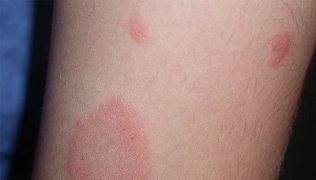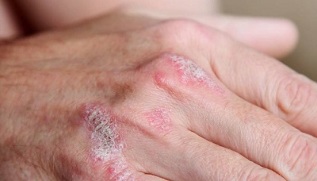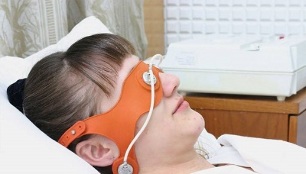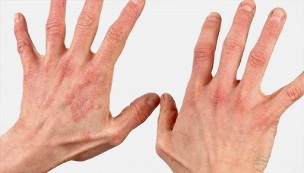Psoriasis is a complex systemic disease associated with skin lesions. In a healthy body, cells live for 30-40 days and then regenerate. With the development of psoriasis, the lifespan of skin cells is 4-5 days. When destroyed, peeling, plaques, drought occur. Treating the initial stage of psoriasis is always easier, so it is important that the disease does not start. Progressive phase therapies differ significantly. This article only reads about the treatment of the initial stages of psoriasis.
Causes of the disease

In psoriasis, several systems are disrupted: endocrine, immune, and nervous. Doctors have not figured out the causes of this disease to the end, nor have they invented a cure for psoriasis.
Experts make the following hypotheses about the development of the disease:
- Viral.Hereditary retroviruses can be the causative agent of psoriasis. Changes in peripheral lymph nodes have been found in many patients that may indicate a viral nature of the disease.
- Immun.Weakened immune systems and impaired defense mechanisms at the cellular level create favorable conditions for the progression of psoriasis. Causes of the disease include autoimmune aggression, in which process lymphocytes begin to attack the body’s own healthy cells.
- Infectious.Many researchers have been looking for the pathogens of psoriasis. Epidermophytos, spirochetes, streptococcus were suspected, but all assumptions remained incorrect. However, scientists have found that infectious diseases: SARS, influenza, tonsillitis are the push mechanism for the development of psoriasis. In 90% of cases, this disease is accompanied by tonsillitis.
- Genetic.Psoriasis comes from parents for the child. 60% of patients have relatives with this skin condition. If a mother or father is diagnosed with psoriasis, the risk of such a disease in a child increases by 25%, while both parents are sick - by 60%.
- Metabolic.Metabolic disorders (lipids, carbohydrates, vitamins, minerals) can cause psoriasis. Patients often have abnormalities in the function of the thyroid gland and other glands in the endocrine system.
Main symptoms and symptoms
This local disease is not contagious. Skin, nails and hair are damaged. Tiny rashes appear on the epidermis, over which papules form over time - red or bright pink areas protruding above the skin. They are covered with silver scales (plaques) from above.

The papules may itch a little or not bother at all, the peeling is imperceptible. Initially, the affected skin areas are 1-2 millimeters in size, and over time their size is estimated to be 10 centimeters or more.
Early stage psoriasis: which parts of the body can be affected by the disease? The main symptoms of the disease with different localizations are:
- On the head.The scalp is covered with red scaly patches, many dandruff-like scales. In this case, the hair is not involved in the pathological process. Itching has been observed in patients. Skin lesions can spread to the neck and ears.
- On the face.In the initial stage, psoriatic plaques form on the skin around the eyes, the eyelids, the nasolabial folds, and the eyebrows. Occasionally, psoriasis affects the mucous membranes of the mouth, face, lips, tongue, and more often the contours of the lips.
- It's at hand.Single red papules appear on the palm and between the fingers. The back of the hand is much less commonly affected. If spots form on the tips of the fingers, they lose their sensitivity over time. Psoriasis can also spread to the nails.
- On the elbow.In the initial stage, some elements of psoriasis appear, covered with silvery scales. They then grow into a continuous affected area of skin from which the scales and thin film can be easily removed. After this action, the affected area turns pink-red, with blood droplets appearing on it.
- On my feet.The skin of the foot and the back suffer. The symptoms are similar to those seen with elbow psoriasis: in the initial stage, small lesions appear that grow to large areas, a symptom of blood dew.
How and how to treat the early stages of psoriasis

Cures Psoriasis Forever - How Realistic Is It? Unfortunately, so far the response has been disappointing - this autoimmune disease can be corrected, but it is impossible to get rid of it completely.
The treatment of psoriasis in the initial stage gives excellent results and allows you to get rid of the visible manifestations of the pathology. Traditional medicine uses ointments, creams, solutions, therapeutic ultraviolet radiation, systemic medication. There are also grandmother’s cures, but they don’t give stable results.
Hypoallergenic diet
Patients with different types of psoriasis need to learn the basics of an alkaline diet. Patients should consume foods that alkalize the internal environment. Their share should be 65-75%, the share of acidic food - 25-35%.
General guidelines:
- One-third of the diet is unprocessed vegetables and fruits. Include beets, cabbage, carrots, herbs, cucumbers, onions, garlic, celery in the menu.
- Another third of the daily menu for psoriasis is a complex carbohydrate and a limited amount of natural sweets. Eat porridge (barley, buckwheat), dried fruits (raisins, dried peaches, dates).
- The last part of the diet is animal and vegetable proteins. Eat lean meat, fish, peas, beans, seeds, eggs, nuts. Polyunsaturated fatty acids should also be on the menu.
- Drink at least 7-10 glasses of clean water a day. Alcohol is prohibited.
- For effective treatment, skip lemons, fatty dairy products and meat, chocolate, red products. Minimum use of honey.
- It is important to exclude sweets, spicy, smoked and sour foods from your diet as they have a bad effect on your skin. The amount of salt should be kept to a minimum.
Medication
Psoriasis is successfully treated by prescribing medications in the initial stages. There are several groups of them.
Topical preparations: creams and ointments. Medicines consist of water, emulsifier and oil. Enough to treat the initial stage of psoriasis.
Ointments are hormonal and non-hormonal. The second group is safer but not as effective.
Pills. Drug treatment of psoriasis is more commonly used to combat the progressive stage.
Systemic therapy. Its nature (dosage, duration of therapy) is determined only by the physician for the treatment of advanced forms of pathology.
The complex uses
- vitamins; fatty acids;
- hepatoprotectors;
- immunomodulators;
- antiallergic agents;
- preparations for removing toxins from the intestines.
Physiotherapy
What is psoriasis and how is it treated? The complexity of the therapy is important. In the initial stages of psoriasis, proper nutrition, use of topical medications, and treatment with physiotherapy procedures. The purpose of the latter is

- decreases central nervous system irritability;
- normalization of the patient's psychological state;
- decrease in itching; Acceleration of resorption of
- psoriatic papules.
Falling asleep:
- Excellent, soothing treatment.
- Due to the complete recovery of the body, the size of the papules decreases and the disease goes into remission.
- A patient with psoriasis should undergo a procedure lasting 8-10 to 20-60 minutes.
- In the first sessions, patients fall into a shallow sleep and then fall into a deep sleep.
X-ray therapy:
- Affected areas of the skin are treated with X-rays, which speed up the process of absorption of psoriasis plaques.
- Treatment is using soft X-rays.
- Each treatment is given every 4-7 days, the full dose of radiation is safe (3, 5-4 Gy).
Ultrasound treatment:
- The skin is treated with ultrasound with 800-3000 kHz vibration.
- The procedure eliminates inflammation, itching and pain, reduces sensitivity to allergens and kills bacteria.
- The cycle of procedures consists of 8 to 14 sessions, each lasting up to a quarter of an hour.
Among other physiological methods effective against psoriasis, it is worth mentioning cryotherapy, immersion in a magnetic field, current treatment, and laser. Treatment of psoriasis at home may involve bathing with sea salt (5 g of salt per liter of water, temperature - 37-38 ° C, duration 15 minutes, 15-20 times a day). As the disease develops, it is important to travel to a sanatorium and participate in health programs.
Ultraviolet radiation
Psoriasis is effectively treated by treating the affected skin surfaces with ultraviolet light. The wavelength should be 311-313 nm, but one skilled in the art can suggest a different radiation spectrum. The patient is immersed in a special chamber equipped with ultraviolet lamps. Before that, you are taking photosensitising drugs that increase the effectiveness of your treatment. An effective method of UV therapy is PUVA therapy. The wavelength is 320-400 nm. To achieve a good treatment result, the patient is subjected to 25 irradiations, as a result of which 80% of the affected areas disappear.
Effective folk remedies for home treatment

You can use folk recipes in the early stages of psoriasis:
- Chicken egg oil treatment. 20 homemade eggs are needed to make half a glass of product. After boiling, boil the product for 15 minutes. It should be yellow. Crush them into a paste and fry in a pan without oil on low heat for 45 minutes. Place the prepared mass in cheesecloth and squeeze. Oil the affected areas 1-2 times a day until the symptoms of psoriasis completely disappear.
- Treatment of the initial stage with a complex ointment for psoriasis. Ingredients: 50 grams of birch tar, 20 grams of fat or Vaseline, 10 grams of boric acid, 30 grams of honey, 1 chicken egg white, 10 grams of fish oil. Store in a dark corner. Lubricate the papules 1-2 times a day.
- Treatment with Celandine juice. Treat the affected skin areas with fresh juice from the roots. This should be done in the initial phase during the summer, for three consecutive seasons.
Peculiarities of child care
Do not use folk remedies on a growing body. They are not always effective and the delay in this case is completely unacceptable. When the initial stage of psoriasis occurs, parents should show the child to a dermatologist who will prescribe a comprehensive examination and treatment. If the disease has not spread much, children are prescribed topical ointments and creams for the skin: keratolytics and anti-inflammatory drugs.
The top layer of psoriasis plaques is removed with tar-sulfur or salicylic acid ointment. To do this, make a bandage on the skin soaked in the active substance, which is removed after 3-5 hours. The child should then take a bath one after the other - this will help to remove the bark painlessly. The last stage of treatment - medicines containing glucocorticoids are applied to the skin at the dose prescribed by your doctor. Children are prescribed antihistamines and vitamin complexes.
What does the initial stage of psoriasis look like - photo

The first stage of psoriasis is accompanied by changes in certain areas of the skin in the body.
If you notice a rash like the one in the photo, rush to your dermatologist. There is no need to hope that the problem alone will be solved.
This skin condition requires complex, rapid, and comprehensive treatment. The earlier a person goes to a professional, the more favorable the result will be.
Successful therapy leads to rapid remission and restoration of quality of life.























